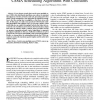Free Online Productivity Tools
i2Speak
i2Symbol
i2OCR
iTex2Img
iWeb2Print
iWeb2Shot
i2Type
iPdf2Split
iPdf2Merge
i2Bopomofo
i2Arabic
i2Style
i2Image
i2PDF
iLatex2Rtf
Sci2ools
135
click to vote
CORR
2010
Springer
2010
Springer
Approaching Throughput-optimality in Distributed CSMA Scheduling Algorithms with Collisions
Abstract--It was shown recently that carrier sense multiple access (CSMA)-like distributed algorithms can achieve the maximal throughput in wireless networks (and task processing networks) under certain assumptions. One important but idealized assumption is that the sensing time is negligible, so that there is no collision. In this paper, we study more practical CSMA-based scheduling algorithms with collisions. First, we provide a Markov chain model and give an explicit throughput formula that takes into account the cost of collisions and overhead. The formula has a simple form since the Markov chain is "almost" time-reversible. Second, we propose transmission-length control algorithms to approach throughput-optimality in this case. Sufficient conditions are given to ensure the convergence and stability of the proposed algorithms. Finally, we characterize the relationship between the CSMA parameters (such as the maximum packet lengths) and the achievable capacity region.
Related Content
| Added | 09 Dec 2010 |
| Updated | 09 Dec 2010 |
| Type | Journal |
| Year | 2010 |
| Where | CORR |
| Authors | Libin Jiang, Jean C. Walrand |
Comments (0)

